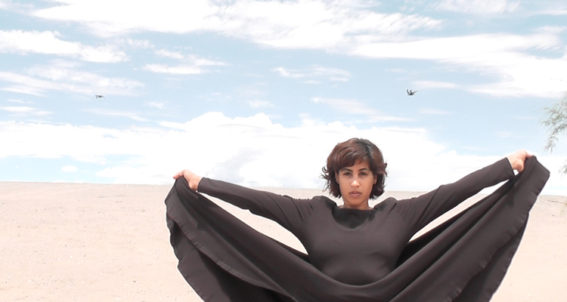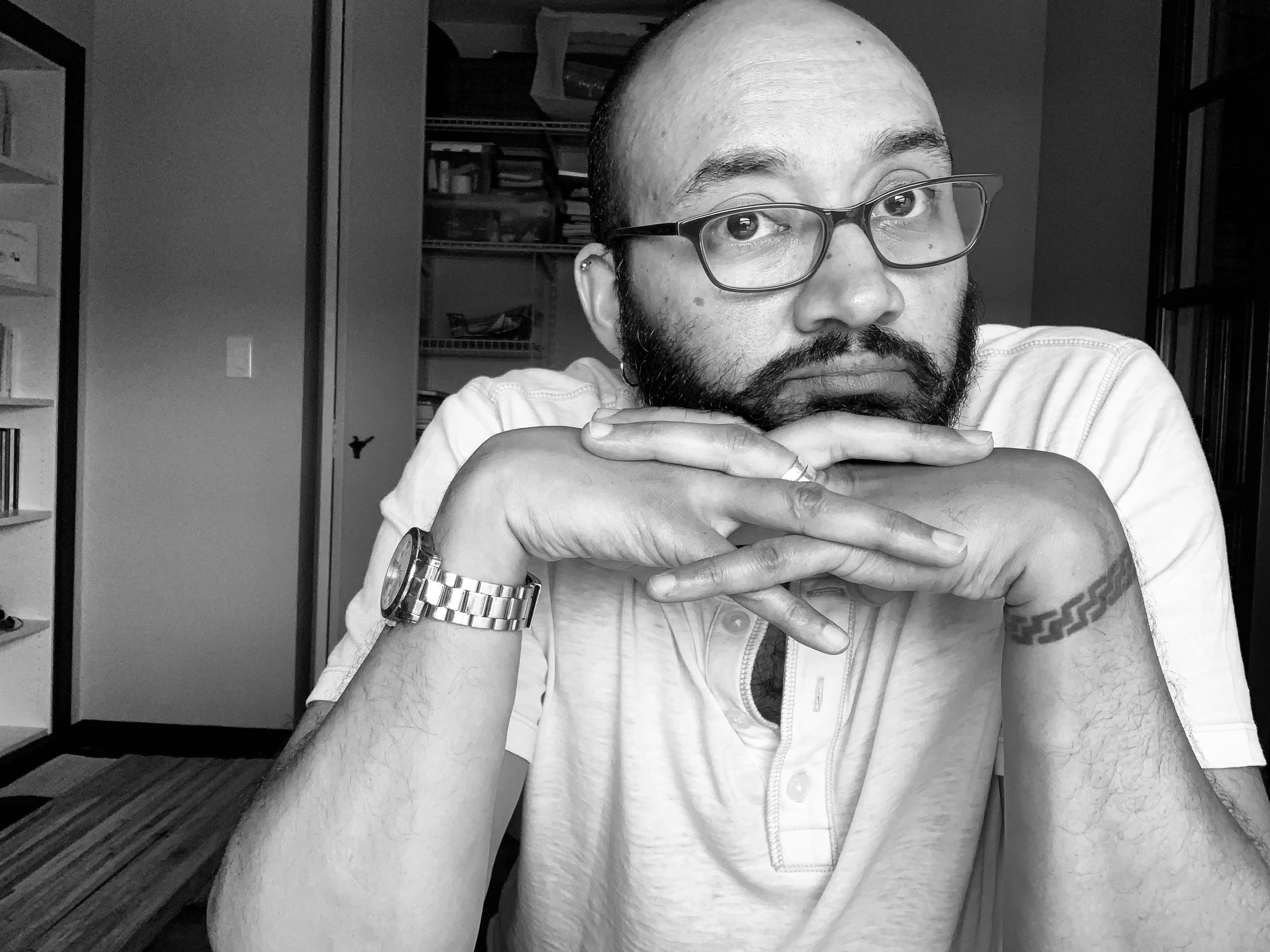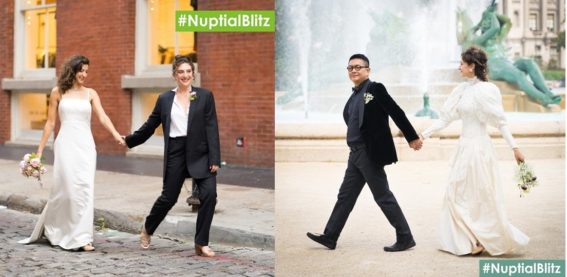Next Wednesday, December 18 from 4pm-8pm, come celebrate with us our 2019 TMT Institute Fellows Sarah Dahnke, Mashuq Mushtaq Deen, Yoni Oppenheim, Gabrielle Revlock, and Sarah K. Williams. TMT’s Open Studios will feature installations, conversations, and performance experiments by our 2019 fellows and we’ll toast their work with a wine and cheese reception.
Check out our fellows’ Blog Interviews and RSVP to our Open Studios today.

Sarah’s journey through the Target Margin Institute has revolved around an inquiry of self identity and the projection of self with an emphasis on authenticity. As a child of a closed adoption, born to parents of Middle Eastern descent, this inquiry is both about the personal and the performance. What is a person’s authentic self? How is this continuously being performed and reperformed on and off stage? During Open Studios, Sarah will further this inquiry by holding “auditions” for her twin sibling. Are you able to be a reflection of Sarah? Fill out this form to schedule an audition: https://forms.gle/5EjohpJGjZTRywZ89
Target Margin Theater (TMT): What inspired you to apply to Target Margin Theater’s Institute?
Sarah Dahnke(SD): I knew I was at a place with my work where I needed to shake it up a bit. I wanted to be challenged in new ways, especially ways in which I hadn’t yet considered. I wanted to have some sort of a support system while figuring out what questions I wanted to ask and how I wanted to investigate them. The Institute seemed like a place where I could spend some time figuring some stuff out without the pressure of needing to prove anything through the production of a product.
TMT: How would you describe your fellowship experience?
SD: I’ve really enjoyed being able to understand a bit more about how other folks approach creating performances and hear the questions they ask in that process. I’ve appreciated being urged to not overthink, to just do. I would describe my experience as a bit discombobulated because the format sort of invites you to just start poking at an idea and seeing what else pops up. So I ask a question, do a little experiment with it, and that might move me to an adjacent question to do a little experiment with. That may lead me to a question that feels fully unrelated but is somehow connected in my brain, and so on and so forth. What’s cool is all of this is a perfectly ok way to work within the Institute.
TMT: How has the Institute impacted your art practice?
SD: I feel like I’ll really know the answer to that a ways down the line after the Institute is over. The Institute planted seeds that will continue to germinate and grow into something that I don’t yet know or understand. I do feel this broader, intersectional understanding of theater after spending time in a cohort with folks who come from a variety of artistic backgrounds. The fact that there is a place for all of us at Target Margin helps me understand that there are more places and contexts for my work and for theirs.
TMT: What did you carry with you into the program? What are you leaving behind? Or taking with you?
SD: I carried with me a real fear of even asking the inquiry questions that could result in work that is rooted at all in my own personal narrative. I’m leaving feeling less attachment to that fear and taking with me David’s voice in my head saying, “Just do the thing.”
Sarah Dahnke is a dancer, choreographer, multimedia artist and arts educator. Most recently, Dahnke has been a guest artist at Tulane, Princeton, UCLA and NYU, received commissions from PEN America and A Studio in the Woods, and has been in residence at Abrons Arts Center and Brooklyn Studios for Dance. She’s a 2019-20 MAP Fund awardee, a Target Margin Institute Fellow, a New Victory LabWorks artist, the inaugural recipient of First Person Plural’s artist grant, and a former awardee of the Fellowship for Utopian Practice by Culture Push.

Tell me about an important moment in your life. But don’t tell me what happened. Instead, tell me about the place, about the quality of light, about the time of day. Tell me what it looked like when you take all the people out and set them to the side. Tell me the color of it. Deen continues his investigation into what is descendent and transcendent, an investigation into frozen space and time. This Open Studio will be a participatory event where audience members are invited to share a momentous moment of their past with Deen.
Target Margin Theater (TMT): What inspired you to apply to Target Margin Theater’s Institute?
Deen (D): I was intrigued by their call for applications, which was unlike any other. I was at a moment of departure in my work, feeling that something was shifting inside me, both in terms of content and form. I wanted to push myself to interrogate that, and I wanted to be around people with whom I could have that conversation. I had tried for years, but had never found the traction I desired. Until TMT.
TMT: How would you describe your fellowship experience?
D: It was tough at times. I think David and Moe were challenging me to question my assumptions, but it was hard to see my assumptions because I was in the middle of them. And I think at times, there might have been assumptions that were made about me and my practice that were premature. I have found that it takes me a while to know what my questions are, and that was true here. It took me about 6 months to really understand what my specific questions were, and then I had to figure out how to work on them. And how to chill out and relax. (I suffer from Good Student Syndrome, it’s how I was raised, and unconsciously, my effort to “get it right” can get in my way.)
TMT: How has the Institute impacted your art practice?
D: I don’t know yet. Time will tell. I do think that early conversations at our first fellows gathering freed something up in me right away that I took into a residency, and I wrote a kind of play I had never written before. FLOOD is a kind of play I had been searching for. I found something new in my voice, or maybe I found a truer version of my voice. I have also grown to more deeply appreciate the conversation that can happen across disciplines.
TMT: What did you carry with you into the program? What are you leaving behind? Or taking with you?
D: Me. Me. & Me. Maybe. I don’t know.
Mashuq Mushtaq Deen is a resident playwright at New Dramatists and a 2019 Lambda Literary Award Winner. His full-length plays include The Empty Place, Flood, The Betterment Society, The Shaking Earth, and Draw the Circle (productions: PlayMakers Rep, Mosaic Theatre, Rattlestick Playwrights Theatre; published: Dramatists Play Service; winner Lambda Literary Award). Deen’s work has been presented/developed/supported by a number of institutions including New Dramatists, Sundance Institute/Ucross, Blue Mountain Center, The Public Theater, NYTW, MacDowell Colony, Bogliasco Foundation, Helene Wurlitzer Foundation, Target Margin Theatre, Keen Company, New Harmony Project, among others. He is represented by the Gurman Agency.

Nuptial Blitz explores the choreography of contemporary wedding photography – how touch, tableau, and gaze convey emotion and story. These images, ubiquitous on social media, are glossy, rooted in fantasy and frequently gendered. One pose I call “The Protector” has the jacket-wearing partner standing behind the gown-wearing partner and hugging ‘her’ waist. Another self explanatory pose I call “Walking/Man Leading.” In stepping into these tableaus, I seek to bring awareness to the power of images to solidify cultural norms, ie. This Is What Romantic Love Looks Like. Can I democratize the image of love by embodying these shapes with people other than my romantic partners?
Target Margin Theater (TMT): What inspired you to apply to Target Margin Theater’s Institute?
Gabrielle Revlock(GB): I had seen work by Target Margin that I thought was interesting. I come from a dance background but I liked that the fellowship was organized by a theater company and was open to artists of all disciplines. That felt refreshing to me. I was eager to be in a community of makers and hopeful that might open up new collaborations or systems of support. As an individual artist it also makes a different to be working under the umbrella of a larger institution–how that validates one’s practice and provides concrete resources.
TMT: How has the Institute impacted your art practice?
GB: The seeds for my work usually come from the intersection of multiple ideas and experiences. The yearlong fellowship was of course one of those. In the application we were asked, “What is the most radical way you can disrupt your practice?” This question lingered with me, and supported my ability to give myself permission to embark on a project that is centered around photography. Since September I’ve been taking wedding photographs, asking people to pose as my partner, in an exploration of the choreography of contemporary wedding photography. I’m now moving from photographs back into live performance (January 8-12, 2020 at The Flea Theater) but the work really takes two forms and I see the photos themselves as a kind of performance made more visible by my iterative presence. In isolation, each photo might convince the viewer that they are looking at newlyweds but in sequence a different story starts to emerge.
TMT: What did you carry with you into the program? What are you leaving behind? Or taking with you?
GB: Wow, a year went by so fast. One thing I’m excited about is that Sarah K Williams invited me into her work and I’m very much looking forward to continuing to explore with her. We’d never met before the Institute so finding a connection that will extend beyond the program feels like a real gain and something to look forward to in 2020!
Gabrielle Revlock is a dance-maker whose work often depicts complicated but relatable interpersonal relationships using a vocabulary that embraces the pedestrian, abstracted by degrees. Her work has been presented across the USA, in Japan, Netherlands, Singapore, Hungary, Russia and India and in NYC at venues including New York Live Arts, JACK, Gibney and The Flea. Her work has been supported by The Pew Center for Arts & Heritage, Independence Foundation, American Dance Abroad, LMCC and the US Department of State. She has performed for Lucinda Childs, Susan Rethorst, Vicky Shick and Jane Comfort. Next up: Jan 8-12 at The Flea. GabrielleRevlock.com